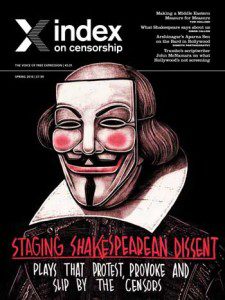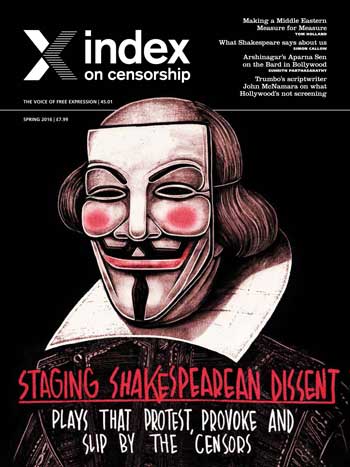
Spring 2016 cover
When I was at drama school in the early 1970s, there was a middle-aged Iranian on the directors’ course called Rokneddin. He’d been ejected from the Shah’s Iran for staging subversive productions. Rokneddin was no political firebrand: he had simply tried to put on Shakespeare’s history plays, which, like all plays in which a king died, were banned in Iran under the Pahlavi dynasty. The plays reminded people all too vividly that the divine right of kings had severe limits.
After the revolution Rokneddin went back, and tried to ply his trade again: this time he disappeared into prison never to be seen again. At the time the Shah’s proscription was seen as the act of an exotic tyrant. Not a bit of it. We can do just as well at home. During the period of George III’s madness in 18th century Britain, King Lear was banished from the stage because the parallels were too obvious.
Shakespeare has had this unique symbolic significance for a long time. From the end of the 17th century, initially in England, and then increasingly in translation across Europe, his stock began its inexorable rise, until he was acclaimed across the whole of the Western world, to a degree never before or since equalled by any other writer. His work was a mirror in which people of widely diverse cultures could see themselves – in Scandinavia, in the Near East, in Spain and the Americas.
He was fervently admired in France, despite his barbaric non-conformism to the laws of classical drama. In Germany and Russia, he was clasped to those nations’ bosoms, claimed by them as, respectively, German and Russian. Shakespeare’s perceived universality – which expanded in the 19th and 20th centuries to include Africa, India, China and Japan – inevitably meant that his work would be recruited to embody the positions of various political and philosophical groupings. And with this came, equally inevitably, censorship and suppression.
Not that Shakespeare was a stranger to censorship in his own time, living and working as he did in, first, the Elizabethan, then the Jacobean, police state where people’s actions and their very thoughts were under constant surveillance. The theatre in which he worked was heavily patrolled by the Master of the Revels, who was charged not only with providing entertainment for the monarch, but with averting controversy, particularly in the sphere of foreign relations. Sometimes this meant deleting matters offensive to allies, sometimes it meant suppressing criticism – or perceived criticism – of the crown, sometimes, more rarely, it meant eliminating morally or sexually offensive material. The theatre was a minefield of significance for dramatists and their companies. Even a simple dig at German and Spanish dress had to be cut from Much Ado About Nothing because of contemporary diplomatic sensitivities. But the reach of the censor went well beyond the explicit …
This is an abridged version of Simon Callow’s in-depth feature for Index on Censorship magazine’s special Shakespeare issue. To read the full piece, which also looks at the role of the Master of the Revels (who Callow portrayed in the Oscar-winning film Shakespeare in Love), buy a print copy or download a digital version via Exact Editions. Each magazine sale helps Index on Censorship fight for free expression worldwide.













